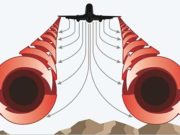The International Air Transport Association (IATA) has begun a program designed for real-time sharing of turbulence data among participating airlines.
Under the Turbulence Aware program, data will be collected from participating airlines and consolidated into a single-source database that can be accessed by the participants.
“Turbulence Aware data is turned into actionable information when fed into an airline’s dispatch or airborne alerting systems,” IATA said in announcing the program last week. “The result is the first global, real-time, detailed and objective information for pilots and operations professionals to manage turbulence.”
IATA Director General and CEO Alexandre de Juniac added that the data will allow for more precise forecasting of turbulence, which in turn will make flights safer and more comfortable for passengers.
Turbulence — the leading cause of injuries to airplane occupants in non-fatal accidents — is expected to become a more frequent problem as a result of climate change, IATA said, adding that the challenges of managing turbulence also are expected to grow.
“As we progress to having accurate turbulence data available at all flight levels, pilots will be able to make much more informed decisions about higher flight levels with smoother air,” IATA said. “Being able to climb to these altitudes will result in a more optimal fuel burn, which will ultimately lead to reduced [carbon dioxide] emissions.”
So far three operators — Aer Lingus, Delta Air Lines and United Airlines — have signed contracts to join the program, and Delta already is contributing data.
IATA said the first operational version of the platform will be developed before the end of 2018, with operational trials in 2019; the final product is expected to be available in 2020.

